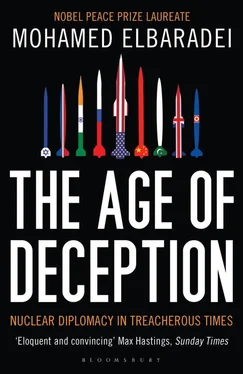Israel had provided a one-line answer to the IAEA’s questions, merely saying that the source of the uranium found was not Israeli, not even acknowledging that it had been responsible for the actual bombing.
“Iran Nears Industrial Nuclear Fuel Production,” February 19, 2007.
Sawers was later appointed head of MI6, the British secret intelligence service.
Rebecca Johnson, who had served as an adviser to UNMOVIC, wrote a detailed rebuttal to Blair in the Bulletin of the Atomic Scientists , which ended by saying that he owed me an apology. Rebecca Johnson, “Tony Blair’s Forgetfulness,” Bulletin of the Atomic Scientists, February 26, 2007.
For example, during a meeting at my home with Nicholas Burns, U.S. undersecretary of state for political affairs, and some of his colleagues, he handed me a paper detailing what the U.S. expected from the Agency in handling Iran’s nuclear file. Naturally, I was displeased, but I merely put the paper to one side, saying calmly, “We know what to do about Iran.” Burns’s retort was pointed: “You know,” he said, “that we pay 25 percent of your budget.”
The French company Total SA is the fourth largest publicly traded oil producer in the world, with operations in Africa, Europe, and the Middle East.
The release of diplomatic cables from the WikiLeaks Web site in late 2010 pointed toward more efforts by Arab leaders behind the scenes, in which they allegedly urged the United States to conduct military strikes on Iran. See, for example, “Arab Leaders Urged U.S. to Attack Iran, WikiLeaks Says,” Mark Hennessy, Irish Times , November 29, 2010.
Putin expressed support for the proposal at the Munich Conference on Security Policy on February 10.
SCR 1737, passed on December 23, 2006.
Daniel Dombey, “Blair Seeks Closer Ties with Moderate Arabs,” Financial Times , December 20, 2006.
The late 2010 WikiLeaks release of cables made clear that Washington was extremely unhappy with the Swiss attempts to work with Iran toward a solution. “U.S. Irked By Over-Eager Swiss Diplomats,” Mathieu van Rohr, Spiegel Online International, December 14, 2010.
As described in chapter 5, I had gotten into a public spat with the Americans in the November 2003 Board meeting, because of their anger when I said that we had not seen evidence linking Iran’s nuclear material or activities to a nuclear weapons program.
Interview with Grupo Vocento, by Dario Valcarcel and Borja Bergareche, “Detecto una escalada gradual que aleja una solución pacífica con Irán,” ABC, May 17, 2007.
Bolton’s statement: “If you believe, as I do, that Iran is never going to be chatted out of its nuclear weapons, because it sees the nuclear weapons program as its trump card, then the only recourse is to dramatically ratchet up the economic and political pressure on Iran and keep open the option of regime change or even military force.” Interview on Hannity and Colmes, Fox News, May 21, 2007. Retrieved at www.realclearpolitics.com/articles/2007/05/interview_with_john_bolton_on_1.html.
The ambassador, Yukiya Amano, to his delight, was traveling and unavailable.
“Inside the IAEA: A Year with the Nuclear Detectives,” two-part BBC Radio 4 documentary, broadcast on May 31 and June 7, 2007.
“Rogue Regulator: Mohamed ElBaradei Pursues a Separate Peace with Iran,” Washington Post, September 5, 2007.
“In the Crossfire,” Economist , September 13, 2007.
Caroline Glick, “ElBaradei’s Nuclear Policy,” Jerusalem Post, August 27, 2007.
Elaine Sciolino and William J. Broad, “An Indispensable Irritant to Iran and Its Foes,” New York Times, September 17, 2007.
Katrina vanden Heuvel, “Proponent of Diplomatic Solution for Iran Smeared by White House,” Nation. Reprinted in “Bush, the Bomb, and Iran,” CBS News Opinion , September 25, 2007.
“IAEA Chief ElBaradei Being Pressured on Iran—Diplomats,” Associated Press, September 9, 2007.
In fact, it was not uncommon for me to hear other members of the European Union express private resentment of the “big three”—France, the United Kingdom, and Germany—and particularly the first two. The other European countries seldom felt they were genuinely consulted on what were nonetheless characterized as joint political stances on Iran. In particular, some viewed the United Kingdom as a sort of U.S. Trojan horse inside the European Union.
Katrin Bennhold and Elaine Sciolino, “After Talk of War, Cooler Words in France on Iran,” New York Times , September 17, 2007.
Sue Pleming, “Rice Swipes at IAEA, Urges Bold Action on Iran,” Reuters, September 17, 2007.
In late 2005, the United States had first briefed the IAEA on a package of information they had received claiming nuclear weaponization studies by Iran related to uranium conversion, high explosives testing, and modification of Shihab-3 missiles to carry a nuclear weapon. Iran had called these allegations baseless, and since the United States had restricted giving the IAEA documentation on this topic to share with Tehran, the Agency had been limited in its ability to verify the information.
Damien McElroy, “Bush Warns of Iran ‘Nuclear Holocaust,’” Telegraph , August 28, 2007.
“Bush Warns of ‘World War III’ if Iran Gains Nuclear Weapons,” Associated Press, October 18, 2007. Retrieved at www.foxnews.com/story/0,2933,303097,00.html.
“German TV Interview: U.S. President Repeats ‘Third World War’ Warning,” November 14, 2007. Retrieved at www.world-peace-society.net/eecore/index.php?/site/C78/.
Seymour Hersh would report that in late 2007 Bush was lobbying the Congress for up to four hundred million dollars to support covert operations in Iran, in activities “designed to destabilize the country’s religious leadership.” “Preparing the Battlefield,” New Yorker, July 7, 2008.
Gareth Evans, the head of the International Crisis Group and former Australian foreign minister, requested my assistance for a similar venture.
Ahmadinejad was invited to speak at the Columbia University School of International and Public Affairs as part of its annual World Leaders Forum. When he arrived, he was greeted with thousands of demonstrators, and university president Lee Bollinger introduced him with a harsh series of criticisms about Ahmadinejad’s political views, which bordered on personal insult.
Elaine Sciolino, “Iran Risks Attack over Atomic Push, French President Says,” New York Times, August 27, 2007.
Muriel Mirak-Weissbach, “Putin Puts Forward a War-Avoidance Plan,” Executive Intelligence Review , October 26, 2007. Retrieved at www.intellibriefs.blogspot.com/2007/10/caspian-summit-putin-puts-forward-war.html.
Читать дальше












